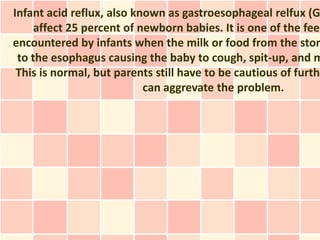Managing Infant Acid Reflux
•Download as PPTX, PDF•
0 likes•278 views
Visit http://acidrefluxandheartburnremedies.com/?p=138 for more info
Report
Share
Report
Share

Recommended
Recommended
More Related Content
What's hot
What's hot (19)
There Are 7 Reasons Why You Can't Have A Natural Conception

There Are 7 Reasons Why You Can't Have A Natural Conception
7 Weeks Pregnant: What to Expect | Pregnancy Week By Week

7 Weeks Pregnant: What to Expect | Pregnancy Week By Week
OPEN Undernutrition Awareness Leaflet - Eating Well, Feeling Good

OPEN Undernutrition Awareness Leaflet - Eating Well, Feeling Good
Baby Vomiting - How To Know When Something's Not Right

Baby Vomiting - How To Know When Something's Not Right
Similar to Managing Infant Acid Reflux
Similar to Managing Infant Acid Reflux (20)
Gastric discomfort in children and herbal remedies MANUAL.pdf

Gastric discomfort in children and herbal remedies MANUAL.pdf
Global Medical Cures™ | Gastroesphageal Reflux in Infants

Global Medical Cures™ | Gastroesphageal Reflux in Infants
NICE Bites: reflujo gastroesofágico en niños y adolescentes

NICE Bites: reflujo gastroesofágico en niños y adolescentes
Abdominal Pain in Children: When to Seek Medical Care

Abdominal Pain in Children: When to Seek Medical Care
Managing Infant Acid Reflux
- 1. Infant acid reflux, also known as gastroesophageal relfux (G affect 25 percent of newborn babies. It is one of the feed encountered by infants when the milk or food from the stom to the esophagus causing the baby to cough, spit-up, and m This is normal, but parents still have to be cautious of furthe can aggrevate the problem.
- 2. As stated by Dr. William Sears, “GER can cause a range of co mild (frequent, painless spitting up) to the severe (colic, abd frequent night waking).” He also mentions the importance with the problem to better understand the cond
- 3. “To better appreciate GER feeding strategies, it helps to know the condition. Normally, a circular band of muscle, called the sphincter (LES), separates the stomach from the esophagus. the stomach, the LES contracts, acting like a one-way valve prevents the stomach contents and acids from regurgitating, up into the esophagus. In some babies, the LES is temporari allows partially digested stomach contents and acids to b irritates the lining of the esophagus and causes the pain t heartburn.”
- 4. Infant acid reflux is known to be normal for babies who are fed. And there will be a time when the baby can manage th the help of the parents when it comes to feeding
- 5. According to an article on the CNN website, “Infant acid reflu on its own when your baby is around 12 to 18 months old. changes in feeding technique — such as smaller, more fre changing position or interrupting feedings to burp — can help control.”
- 6. Although GER is a common problem among infants, it can w further irritability and break down of health. According to th the following symptoms are prevalent with your baby, co immediately as it may be a sign of gastroesophageal reflux d the baby:
- 8. Spits up forcefully, causing stomach contents to shoot out o
- 9. Spits up green or yellow fluid
- 10. Spits up blood or a material that looks like coffee
- 11. Resists feedings
- 12. Has blood in his or her stool
- 13. Has other signs of illness, such as fever, diarrhea or diffic
- 14. Begins vomiting at age 6 months or older
- 15. Be aware that all babies will spit-up and is not necessarily a reflux. However, be mindful of the symptoms of GER and con if needed.